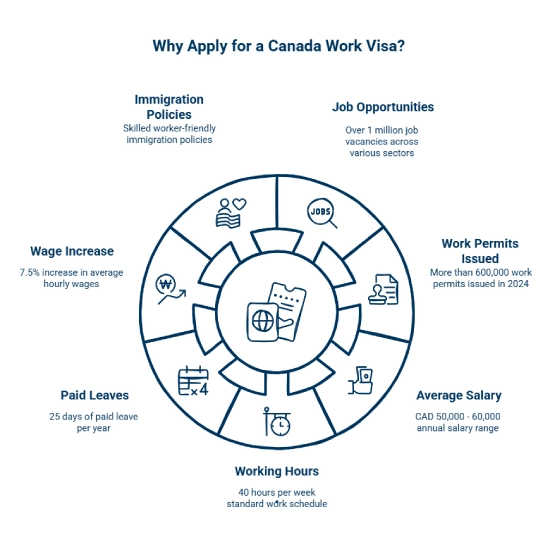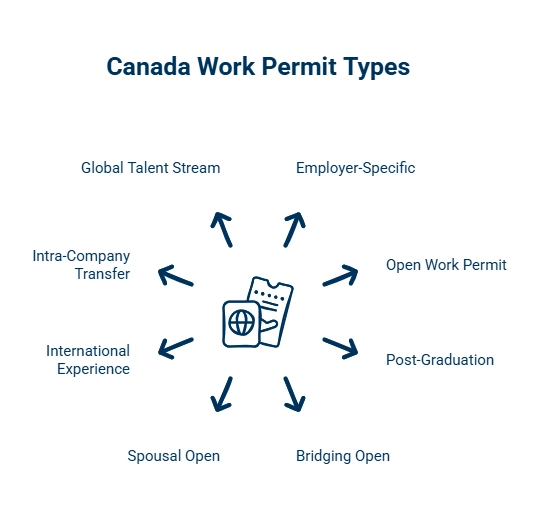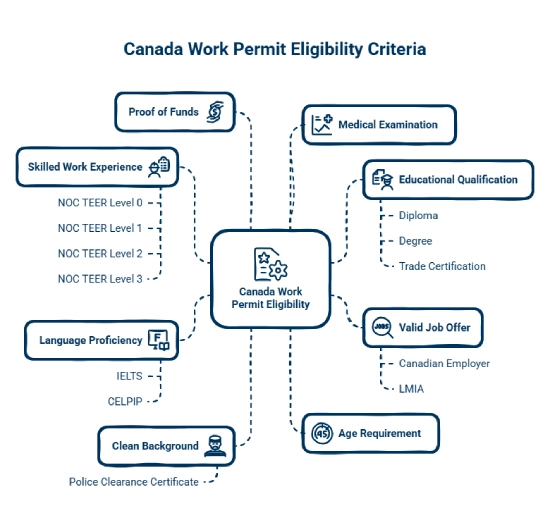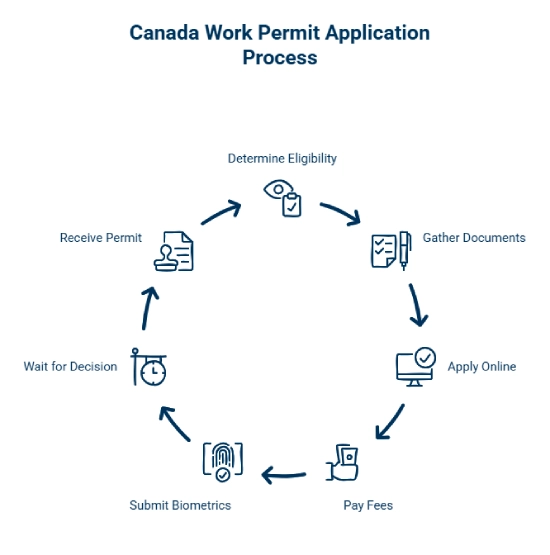Why Canada Work Visa?
- 1 million+ job vacancies in Canada
- 600,000+ work permits issued in 2024
- Average salary: CAD 50,000 – 60,000
- 40 working hours per week
- 25 paid leaves annually
- Average hourly wages increased by 7.5%
- Skilled worker-friendly immigration policies

What is a Canada Work Permit?
A Canada Work Permit is an official authorization that allows foreign nationals to work legally in Canada for a specific employer and duration. Issued by Immigration, Refugees and Citizenship Canada (IRCC), it is typically tied to a job offer and may require a Labour Market Impact Assessment (LMIA). Work permits can be employer-specific or open, depending on the applicant's eligibility. This permit plays a key role in helping skilled professionals gain Canadian work experience and potentially transition to permanent residency.
*Want to work in Canada? Sign up with Y-Axis to guide you with the process.
Types of Canada Work Permits
Canada offers a range of work permits tailored to different types of foreign workers, depending on the nature of the job, the applicant’s nationality, and whether a Labour Market Impact Assessment (LMIA) is required. These permits allow skilled professionals, temporary workers, businesspeople, and intra-company transferees to work legally in Canada. Understanding the right type of permit is essential for a successful application.
Here are the main types of Canada work permits:
- Employer-Specific Work Permit
- Open Work Permit
- Post-Graduation Work Permit (PGWP)
- Bridging Open Work Permit (BOWP)
- Spousal Open Work Permit
- International Experience Canada (IEC)
- Intra-Company Transfer Work Permit
- Global Talent Stream (GTS)

LMIA Canada
A Labour Market Impact Assessment (LMIA) is an essential document that Canadian employers must obtain before hiring most foreign workers. Issued by Employment and Social Development Canada (ESDC), it serves as proof that there is a genuine need for a foreign worker to fill a specific job role because no Canadian citizen or permanent resident is available to do so. A positive LMIA, often referred to as a confirmation letter enables the foreign national to apply for a Canadian work permit. For employers looking to hire through the Temporary Foreign Worker Program (TFWP), securing an LMIA is one of the most important first steps in the recruitment process.
Canada Open Work Permit
A Canada Open Work Permit allows foreign nationals to work for any employer in Canada without needing a specific job offer or a Labour Market Impact Assessment (LMIA). This flexible permit is ideal for individuals who want the freedom to work in Canada while exploring long-term settlement options or supporting a spouse or family member already living in Canada.
Visas You Can Apply for with an Open Work Permit:
- Spousal Open Work Permit (for spouses/common-law partners of skilled workers or students)
- Post-Graduation Work Permit (PGWP)
- Bridging Open Work Permit (BOWP)
- Open Work Permit for International Experience Canada (IEC)
- Open Work Permit under Vulnerable Worker Policy
- Open Work Permit for Permanent Residence Applicants in Canada (spousal sponsorship)
IEC Canada
The International Experience Canada (IEC) program is a unique opportunity for young people from over 30 countries—including the UK—to live, work, and explore Canada. Designed to foster cultural exchange and international work experience, the IEC program allows individuals typically aged 18 to 35 to gain hands-on experience while enjoying the vibrant Canadian lifestyle.
Whether you are looking to fund your travels, gain relevant industry experience, or complete an internship, IEC Canada offers flexible pathways that cater to different goals. It’s an excellent starting point for anyone considering a long-term stay or future immigration to Canada.
Types of IEC Canada Programs
- Working Holiday
Ideal for those who want the freedom to work and travel across Canada. This open work permit allows you to work for most employers in any location.
- Young Professionals
Designed for individuals with a job offer in their field of study or expertise. This employer-specific permit helps you gain valuable international work experience.
- International Co-op (Internship)
Tailored for post-secondary students who need to complete a work placement or internship as part of their academic program. A great way to gain real-world experience in a Canadian workplace.
*Want to migrate to Canada? Let Y-Axis help you with the process.
Benefits of Canada Work Permit Visa
Some of the benefits of applying for a Canada work permit visa are as follows:
- Access to High-Paying Jobs: Canada offers competitive salaries with the average wage for foreign workers ranging from CAD 50,000 to CAD 70,000 annually, depending on the sector.
- Pathway to Permanent Residency: Many Canadian work permits are stepping stones to Permanent Residency (PR) through programs like Express Entry and Provincial Nominee Programs (PNPs).
- Opportunity to Bring Dependents: Work permit holders can often bring their spouse and children, with spouses eligible for open work permits and children allowed to study in Canada.
- Global Work Experience: Gain valuable international work experience in a diverse and stable economy, enhancing your global employability.
- Access to Public Services: Temporary foreign workers may be eligible for provincial healthcare coverage in some regions after a waiting period.
- Work-Life Balance: With a standard 40-hour work week, generous paid leave, and supportive labour laws, Canada promotes a healthy work-life balance.
- Multicultural Work Environment: Enjoy working in a welcoming, multicultural society that values diversity and inclusion in the workplace.
Canada Work Visa for UK Residents
Canada continues to be a popular destination for UK residents seeking better career opportunities and a high quality of life. With strong historical ties, a shared language, and a transparent immigration system, the process of securing a Canadian work visa is straightforward for eligible UK citizens. Whether you are a skilled professional, a recent graduate, or looking to join a Canadian employer, several visa pathways, like the International Mobility Program and Global Talent Stream, make it easier to live and work in Canada.
Canada Work Permit Eligibility
To apply for a Canada Work Permit, applicants must fulfill a set of essential criteria, regardless of the type of permit. These requirements ensure that individuals are qualified to work in Canada and contribute effectively to the workforce.
- Age Requirement: Applicants should generally be below 45 years of age.
- Valid Job Offer: A legitimate job offer from a Canadian employer supported by a positive Labour Market Impact Assessment (LMIA) is typically required.
- Skilled Work Experience: A minimum of 2 years of relevant, full-time skilled work experience in an occupation classified under the NOC TEER Level 0, 1, 2, or 3.
- Language Proficiency: Demonstrated ability in English or French, usually through recognized tests like IELTS or CELPIP.
- Educational Qualification: A post-secondary diploma, degree, or trade certification relevant to the job role is often needed.
- Proof of Funds: Sufficient financial means to support yourself and your family during your stay in Canada.
- Clean Background: A police clearance certificate showing no criminal history.
- Medical Examination: A health check-up may be required

Canada Work Permit Requirements
To legally work in Canada as a foreign national, you must obtain a valid work permit issued by Immigration, Refugees and Citizenship Canada (IRCC). The requirements vary depending on the type of work permit, open or employer-specific but in all cases, applicants must meet certain eligibility criteria and provide supporting documents. Ensuring your application is accurate and complete helps avoid delays or rejections.
General Requirements for a Canada Work Permit
- Valid Job Offer (if employer-specific): You must have a written offer of employment from a Canadian employer.
- Labour Market Impact Assessment (LMIA): Required in most cases unless the job is LMIA-exempt.
- Proof of Qualifications: Academic transcripts, training certificates, or relevant work experience aligned with the job.
- Proof of Financial Support: Evidence that you can support yourself and accompanying family members.
- Valid Passport: Must be valid for the entire duration of your intended stay.
- Medical Examination: Mandatory for certain jobs and if the stay exceeds six months.
- Police Clearance Certificate: To show you have no criminal background.
- Intent to Leave: You must demonstrate you will leave Canada at the end of your authorized stay.
- Language Proficiency (if applicable): Some roles may require proof of English or French proficiency.
- Biometrics: You may be required to submit fingerprints and a photo at a Visa Application Centre (VAC).
Required Forms for Canada Work Permit Application
- IMM 1295 – Application for Work Permit Made Outside of Canada
- IMM 5645 – Family Information Form
- IMM 5409 – Statutory Declaration of Common-Law Union (if applicable)
- IMM 5476 – Use of a Representative (if applicable)
- IMM 5475 – Authority to Release Personal Information (if applicable)
Documents Required for Canada Work Permit Application
- Job offer letter or employment contract
- Positive LMIA (if required)
- Proof of professional qualifications (degrees, diplomas, certificates)
- Valid passport with enough blank pages
- Financial proof (bank statements, sponsor letter, etc.)
- Police clearance certificate(s)
- Medical exam results (if required)
- Resume or CV
- Two passport-sized photos as per specifications
- Marriage certificate and children’s birth certificates (if dependents are accompanying)
Steps to Apply for Canada Work Permit
You can follow the below steps to apply for a Canada work permit:
Step 1: Determine Your Eligibility
Check if you meet the general eligibility requirements, such as having a valid job offer, relevant work experience, and the necessary documents based on the type of work permit (open or employer-specific).
Step 2: Gather the Required Documents
Prepare all mandatory documents, including:
- Job offer letter
- Positive LMIA (if applicable)
- Proof of work experience
- Passport, education certificates, and language test results
- Police clearance and medical exam (if required)
Step 3: Create an IRCC Account and Apply Online
Visit the IRCC official website to create your secure account. Complete the work permit application form and upload your documents.
Step 4: Pay the Application Fee
Pay the applicable processing fee and, if necessary, the biometric fee. The work permit fee for most applicants is CAD 155, and biometric collection (if required) costs CAD 85.
Step 5: Submit Biometrics and Attend Interview (if applicable)
You may be asked to give biometrics (fingerprints and a photo). In some cases, an interview may be scheduled at your local visa application centre (VAC).
Step 6: Wait for Processing and Decision
Processing times vary based on the applicant's country of residence and the type of permit. Track your application through your IRCC account.
Step 7: Receive Your Work Permit
If approved, you will receive a Port of Entry (POE) Letter of Introduction. Present this to Canadian border officials upon arrival to receive your physical work permit.

Canada Work Permit Processing Time
The processing time for a Canada Work Permit varies depending on the applicant’s country of residence, the type of work permit (open or employer-specific), and whether all required documents are submitted correctly. On average, processing takes 4 to 27 weeks for most countries, as per the official IRCC website. Factors such as LMIA approvals, biometric submissions, and application completeness can also affect timelines. Applicants are advised to check the IRCC processing tool for the most accurate estimate based on their situation.
Canada Work Visa Fees
|
Type of Canada work visa |
Fees |
|
Work permit (including extensions) – per person |
$155.00 |
|
Work permit (including extensions) – per group (3 or more performing artists) |
$465.00 |
|
Maximum fee for a group of 3 or more performing artists applying at the same time and place |
|
|
International Experience Canada |
$161.00 |
|
Open work permit holder |
$100.00 |
|
Restore your status as a worker |
$355.00 |
|
Restore your status ($200) and get a new work permit ($155) |
|
|
Students |
|
|
Study permit (including extensions) - per person |
$150.00 |
|
Restore your status as a student |
$350.00 |
|
Restore your status ($200) and get a new study permit ($150) |
|
|
Inadmissibility |
|
|
Temporary resident permit |
$100.00 |
|
Biometrics |
|
|
Biometrics – per person |
$85.00 |
|
Biometrics - per family (2 or more people) |
$170.00 |
|
Maximum fee for a family of 2 or more people applying at the same time and place |
|
|
Biometrics - per group (3 or more performing artists) |
$255.00 |
|
Maximum fee for a group of 3 or more performing artists applying at the same time and place |
Jobs in Canada for UK Residents
Canada continues to be a popular destination for skilled professionals from the UK, offering strong job prospects across various sectors. As of 2024, the country has over 1 million job vacancies, with key demand in IT, healthcare, engineering, and skilled trades. UK residents benefit from cultural compatibility, high average salaries (CAD 55,000–70,000), and a straightforward immigration process through programs like Express Entry and LMIA-based work permits.
|
Occupation |
Average Salary range in CAD |
|
Sales Representative |
$52,000 to $64,000 |
|
Accountant |
$63,000 to $75,000 |
|
Engineering Project Manager |
$74,000 to $92,000 |
|
Business Analyst |
$73,000 to $87,000 |
|
IT Project Manager |
$92,000 to $114,000 |
|
Account Manager |
$75,000 to $92,000 |
|
Software Engineer |
$83,000 to $99,000 |
|
Human Resources |
$59,000 to $71,000 |
|
Customer Service Representative |
$37,000 to $43,000 |
|
Administrative Assistant |
$37,000 to $46,000 |
How Can Y-Axis Help You?
Y-Axis, the leading overseas immigration consultancy in the UK, provides unbiased immigration services for every client based on their interests and requirements. The impeccable services of Y-Axis include:
- Free eligibility check through Canada Immigration Points Calculator
- Expert guidance/counseling for Canada Immigration
- Coaching services: Expert CELPIP coaching, IELTS proficiency Coaching
- Free career counseling; book your slot today
- Complete guidance for Canada PR visa
- Job search services to find related jobs in Canada
Looking for Inspiration
Explore what Global Citizens have to say about Y-Axis in shaping their future
Frequently Asked Questions
